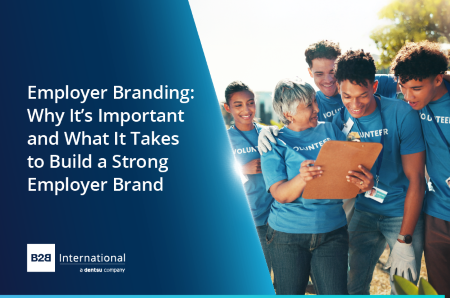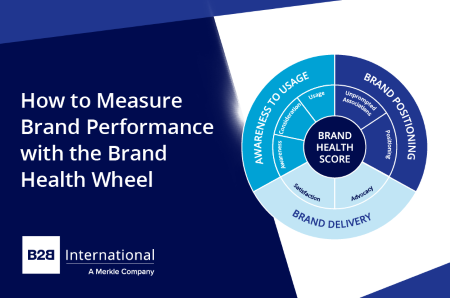
As B2B market researchers, we spend a lot of time thinking about branding. From our own research, we know that building a powerful brand is a key strategy for B2B marketers, and we have helped countless clients develop, assess, and track their brand positioning.
It is fair to say that the majority of the conversation about branding focuses on the perspective of the buyer – the (potential) customer. There are a wealth of measures and metrics that help us understand the link between the strength of a brand and its performance, and evidence shows that a strong brand is more likely to be preferred and purchased.
However, buyers are not the only important group to be influenced by a brand. In this article, we will explore the topic of the ‘Employer Brand’ – the way in which the brand is conveyed and known in the job market, and what it has to offer to (prospective) employees. We are seeing organizations place increasing focus on how they are perceived as an employer. For example, CIPD research in the UK found that 81% of employers have taken action to improve their Employer Brand in the last year.

Why is a Strong Employer Brand Important?
-
A strong Employer Brand helps to attract and retain talented, high-quality staff, making it easier to compete with other organizations for top talent.
-
It also appeals to talent who feel a personal commitment to the company values, leading to employees who are more engaged and motivated.
-
A strong Employer Brand also reflects positively on your brand as a whole – a congruent brand experience across employees and customers is highly compelling.

What Does a Strong Employer Brand Look Like?
A strong Employer Brand is the perception or reputation of an organization as a desirable place to work. The Harvard Business Review defines three components of an Employer Brand:
-
Reputation – This encompasses the potential impact on an employee’s future career, the day-to-day work environment, and the impact on broader society.
-
Proposition – The employer-employee relationship, including expectations of employees and rewards for meeting or exceeding these expectations.
-
Experience – Reflects the organization’s ability to deliver on their Employee Value Proposition, assessed through reviews and endorsements from current and former employees.
This analysis from the Harvard Business Review aligns with the widely held observation that employees today prioritize not only salary and job descriptions, but also company culture, values, social impact, and work-life balance. Indeed, the Employer Value Proposition (EVP) encompasses ‘the set of offerings, associations, and values that employers provide to employees in return for their contributions’.
Salary is no longer the key differentiator between employers competing for talent. Instead, organizations are carving out diverse propositions and ‘personalities’ around differentiating topics such as flexible working, social impact, and DEI initiatives. Research by LinkedIn revealed a significant increase in job advertisements in which the employer showcased their company values, demonstrating a clear rise in the importance of such criteria.

How Can You Enhance Your Employer Brand?
-
This starts with developing a strong EVP. Michael Page recommends several questions that can help organizations arrive at their unique EVP. For example: Why are potential employees attracted to the company? What do existing employees value most about working there? Why do they leave? It is crucial that your organization is able to live up to the EVP, as a disconnect between EVP and reality can be a key reason for poor employee experience.
-
Employee research can be utilized – through surveys, focus groups, and feedback from former employees and applicants – to help understand the employee experience and develop a realistic EVP. Ensuring that employees can provide open and honest feedback, possibly through external independent research companies, is important for gaining accurate insights.
Readers of this article also viewed:
5 Key Benefits of Internal Stakeholder Research (And 3 Tips for Running Successful Internal Interviews) The DEI Advantage: Driving Business, People, and Society
How to Measure Brand Performance with the Brand Health Wheel How Market Research Can Help Enhance Brand Communication in B2B Why B2B Companies Should Consider Their Brand Personality
To discuss how our tailored insights programs can help solve your specific business challenges, get in touch and one of the team will be happy to help.

